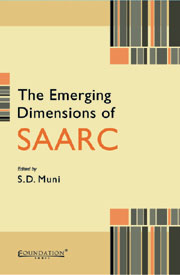Book contents
- Frontmatter
- Contents
- Preface
- List of Figures
- List of Tables
- 1 SAARC Prospects: The Changing Dimensions
- 2 SAARC and South Asian Economic Integration
- 3 Coping with the Emerging Challenges: Poverty and Food Security
- 4 SAARC Energy Cooperation: Energy Security and Environmental Challenges
- 5 Sub-Regional Cooperation under SAARC: An Economic Analysis
- 6 SAARC: Social Charter and Human Security
- 7 SAARC and the South Asian Security Architect
- 8 Fighting Terrorism through SAARC?
- 9 SAARC and the Evolving Asian Regionalism
- 10 Role of SAARC Observers: Members' Perspectives
- 11 Role of SAARC Observers: Observers' Perspectives
- 12 Concluding Remarks
- About the Contributors
- Index
10 - Role of SAARC Observers: Members' Perspectives
Published online by Cambridge University Press: 26 October 2011
- Frontmatter
- Contents
- Preface
- List of Figures
- List of Tables
- 1 SAARC Prospects: The Changing Dimensions
- 2 SAARC and South Asian Economic Integration
- 3 Coping with the Emerging Challenges: Poverty and Food Security
- 4 SAARC Energy Cooperation: Energy Security and Environmental Challenges
- 5 Sub-Regional Cooperation under SAARC: An Economic Analysis
- 6 SAARC: Social Charter and Human Security
- 7 SAARC and the South Asian Security Architect
- 8 Fighting Terrorism through SAARC?
- 9 SAARC and the Evolving Asian Regionalism
- 10 Role of SAARC Observers: Members' Perspectives
- 11 Role of SAARC Observers: Observers' Perspectives
- 12 Concluding Remarks
- About the Contributors
- Index
Summary
An Indian Perspective
A large number of plurilateral organisations have been formed in the past half century, responding to political, economic and strategic needs of member countries. The limitations of the United Nations have also encouraged groups of countries to look for more limited platforms for mutual interaction. Some have a largely economic agenda, focused on trade, while others have a larger political agenda. Some are based on the principle of geographical contiguity, hence are ‘regional’ groups, others are based on a shared economic, political or security interest. Almost all such plurilateral associations invite Observers to attend some part of their Summit meetings. Typically, such Observers have some interest in the agenda of the group and so value this status.
The role of Observers would, therefore, vary from one group to another. Typically there would be three types of Observers:
first, who wish to become members;
second, with no interest in membership, but interested in keeping a tab on the proceedings; and,
third, who may wish to be present at gatherings not to observe what members are doing, but to observe other Observers!
Myanmar was invited to be an Observer in ASEAN in 1996, prior to its eventual induction as a member in 1997. This is an example of ‘Observer status as a prelude to membership’. Several Observers at EU summits have subsequently become members.
- Type
- Chapter
- Information
- The Emerging Dimensions of SAARC , pp. 229 - 276Publisher: Foundation BooksPrint publication year: 2010
- 1
- Cited by



